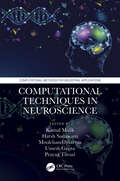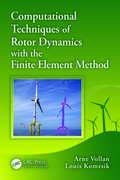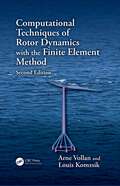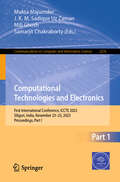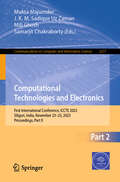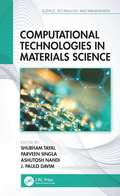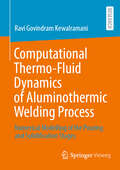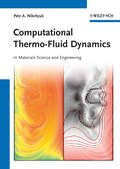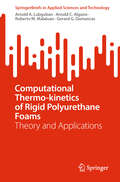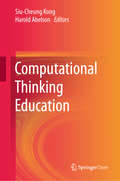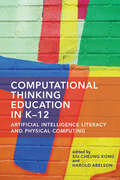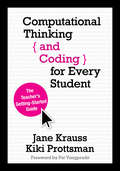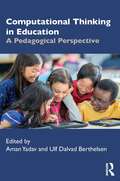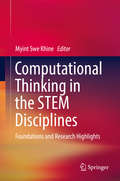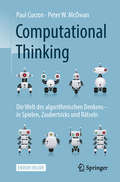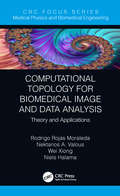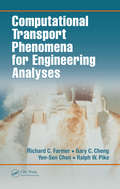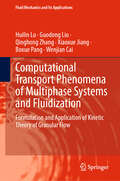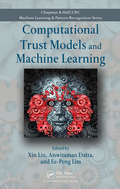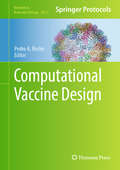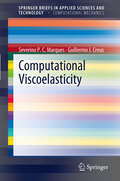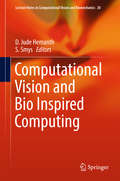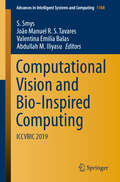- Table View
- List View
Computational Techniques in Neuroscience (Computational Methods for Industrial Applications)
by Umesh Gupta Moolchand Sharma Prayag Tiwari Kamal Malik Harsh SadawartiThe text discusses the techniques of deep learning and machine learning in the field of neuroscience, engineering approaches to study the brain structure and dynamics, convolutional networks for fast, energy-efficient neuromorphic computing, and reinforcement learning in feedback control. It showcases case studies in neural data analysis. Features: Focuses on neuron modeling, development, and direction of neural circuits to explain perception, behavior, and biologically inspired intelligent agents for decision making Showcases important aspects such as human behavior prediction using smart technologies and understanding the modeling of nervous systems Discusses nature-inspired algorithms such as swarm intelligence, ant colony optimization, and multi-agent systems Presents information-theoretic, control-theoretic, and decision-theoretic approaches in neuroscience. Includes case studies in functional magnetic resonance imaging (fMRI) and neural data analysis This reference text addresses different applications of computational neuro-sciences using artificial intelligence, deep learning, and other machine learning techniques to fine-tune the models, thereby solving the real-life problems prominently. It will further discuss important topics such as neural rehabili-tation, brain-computer interfacing, neural control, neural system analysis, and neurobiologically inspired self-monitoring systems. It will serve as an ideal reference text for graduate students and academic researchers in the fields of electrical engineering, electronics and communication engineering, computer engineering, information technology, and biomedical engineering.
Computational Techniques of Rotor Dynamics with the Finite Element Method (Computational Techniques of Engineering)
by Arne Vollan Louis KomzsikFor more than a century, we have had a firm grasp on rotor dynamics involving rigid bodies with regular shapes, such as cylinders and shafts. However, to achieve an equally solid understanding of the rotational behavior of flexible bodies-especially those with irregular shapes, such as propeller and turbine blades-we require more modern tools and m
Computational Techniques of Rotor Dynamics with the Finite Element Method (Computational Techniques of Engineering)
by Arne Vollan Louis KomzsikRotor dynamics is both a classical and a modern branch of engineering science. The rotation of rigid bodies, mainly those with regular shapes such as cylinders and shafts, has been well understood for more than a century. However, analyzing the rotational behavior of flexible bodies, especially those with irregular shapes like propellers and blades, requires more modern tools such as finite elements, hence the title and focus of this book.In the dozen years since the original publication, this book was used in teaching engineering students at universities and in consulting in the industry. During those activities, several topics were deemed to require further explanations. Students requested a deeper finite element technology foundation in certain places to make the book self‑contained in that regard also. Some desired more details about the computational and numerical solutions. These requests are answered in new sections of this edition. Practicing engineers asked for a detailed industrial application case study and such was added in a new chapter dealing with wind turbines.This book is composed of two parts, the first focusing on the theoretical foundation of rotor dynamics and the second focusing on the engineering analysis of industrial structures. The theoretical foundation is built on physics, calculus, and finite element technology chapters. Computational and numerical techniques provide free vibration and response analyses solutions. The industrial engineering analysis part contains chapters analyzing jet‑engine turbine wheels, aircraft propellers, and wind turbine blades. This book concludes with a new industrial case study based on a recent modern wind turbine development project.
Computational Technologies and Electronics: First International Conference, ICCTE 2023, Siliguri, India, November 23–25, 2023, Proceedings, Part I (Communications in Computer and Information Science #2376)
by Samarjit Chakraborty Mukta Majumder J. K. M. Sadique Uz Zaman Mili GhoshThis two-volume set, CCIS 2376 and CCIS 2377, constitutes proceedings from the First International Conference on Computational Technologies and Electronics, ICCTE 2023, held in Siliguri, India, during November 23–25, 2023. The 46 full papers presented here were carefully selected and reviewed from 157 submissions. These papers have been organized in the following topical sections: Pat I- Pattern recognition & AI Part II- Data communication & security; Applied electronics.
Computational Technologies and Electronics: First International Conference, ICCTE 2023, Siliguri, India, November 23–25, 2023, Proceedings, Part II (Communications in Computer and Information Science #2377)
by Samarjit Chakraborty Mukta Majumder J. K. M. Sadique Uz Zaman Mili GhoshThis two-volume set, CCIS 2376 and CCIS 2377, constitutes proceedings from the First International Conference on Computational Technologies and Electronics, ICCTE 2023, held in Siliguri, India, during November 23–25, 2023. The 46 full papers presented here were carefully selected and reviewed from 157 submissions. These papers have been organized in the following topical sections: Pat I- Pattern recognition & AI Part II- Data communication & security; Applied electronics.
Computational Technologies in Materials Science (Science, Technology, and Management)
by J. Paulo Davim Shubham Tayal Parveen Singla Ashutosh NandiAdvanced materials are essential for economic security and human well-being, with applications in industries aimed at addressing challenges in clean energy, national security, and human welfare. Yet, it can take years to move a material to the market after its initial discovery. Computational techniques have accelerated the exploration and development of materials, offering the chance to move new materials to the market quickly. Computational Technologies in Materials Science addresses topics related to AI, machine learning, deep learning, and cloud computing in materials science. It explores characterization and fabrication of materials, machine-learning-based models, and computational intelligence for the synthesis and identification of materials. This book • Covers material testing and development using computational intelligence • Highlights the technologies to integrate computational intelligence and materials science • Details case studies and detailed applications • Investigates challenges in developing and using computational intelligence in materials science • Analyzes historic changes that are taking place in designing materials. This book encourages material researchers and academics to develop novel theories and sustainable computational techniques and explores the potential for computational intelligence to replace traditional materials research.
Computational Thermo-Fluid Dynamics of Aluminothermic Welding Process: Numerical Modelling of the Pouring and Solidification Stages
by Ravi Govindram KewalramaniThe aluminothermic (AT) welding process, also known as Thermit welding, is an essential process for joining and repairing rails due to its simplicity, robustness, portability and economic usage. This book presents a multi-fluid, multiphase numerical model to predict the thermal flow field within the mould during the pouring and solidification stages of the AT welding process, developed using the finite volume method-based open-source CFD software OpenFOAM. The numerical model is rigorously validated not only against well-documented cases in the literature but also through an in-house, low-cost experiment designed to investigate the temporal and spatial evolution of the solid-liquid interface front during the melting of paraffin wax in a rectangular enclosure in the presence of a gas phase. The simulation results show good agreement with the validation cases. Moreover, insights into the thermal pouring stage with solid-liquid phase change phenomena are provided. For this purpose, the available k − ε turbulence model is also extended to incorporate the solid-liquid phase change phenomena. Finally, the temporal and spatial evolution of the solid-liquid interface front during the solidification stage is examined, and the influence of initial molten metal temperature and thermophysical properties on the final weld profiles is systematically studied.
Computational Thermo-Fluid Dynamics: In Materials Science and Engineering
by Petr A. NikrityukCombining previously unconnected computational methods, this monograph discusses the latest basic schemes and algorithms for the solution of fluid, heat and mass transfer problems coupled with electrodynamics. It presents the necessary mathematical background of computational thermo-fluid dynamics, the numerical implementation and the application to real-world problems. Particular emphasis is placed throughout on the use of electromagnetic fields to control the heat, mass and fluid flows in melts and on phase change phenomena during the solidification of pure materials and binary alloys. However, the book provides much more than formalisms and algorithms; it also stresses the importance of good, feasible and workable models to understand complex systems, and develops these in detail. Bringing computational fluid dynamics, thermodynamics and electrodynamics together, this is a useful source for materials scientists, PhD students, solid state physicists, process engineers and mechanical engineers, as well as lecturers in mechanical engineering.
Computational Thermo-kinetics of Rigid Polyurethane Foams: Theory and Applications (SpringerBriefs in Applied Sciences and Technology)
by Arnold A. Lubguban Roberto M. Malaluan Gerard G. Dumancas Arnold C. AlgunoThis book presents a detailed exploration of advanced computational modeling techniques in the design, testing, and applications of rigid polyurethane foams (RPUFs). By leveraging modern approaches such as database-driven predictions, iterative simulations, and emerging innovations in computational material engineering, it offers a more accurate and efficient way to model the thermo-kinetic behavior of RPUFs. The necessity for computational tools in materials science is intertwined with the growth of the polyurethane market, with many academic and industrial researchers seeking to adopt these methods. The book comprehensively discusses the advancement in bridging the gap between traditional empirical methods and cutting-edge computational techniques specifically applied to RPUFs. Furthermore, it is a comprehensive guide to the computational modeling of the thermo-kinetics of RPUFs, making it an essential resource for researchers, engineers, and academicians seeking to innovate in material science and engineering. This book addresses a niche yet critical area within this broader scope.
Computational Thermodynamics of Materials
by Liu Yi Wang Zi-KuiThis unique and comprehensive introduction offers an unrivalled and in-depth understanding of the computational-based thermodynamic approach and how it can be used to guide the design of materials for robust performances, integrating basic fundamental concepts with experimental techniques and practical industrial applications, to provide readers with a thorough grounding in the subject. Topics covered range from the underlying thermodynamic principles, to the theory and methodology of thermodynamic data collecting, analysis, modeling, and verification, with details on free energy, phase equilibrium, phase diagrams, chemical reactions, and electrochemistry. In thermodynamic modelling, the authors focus on the CALPHAD method and first-principles calculations. They also provide guidance for use of YPHON, a mixed-space phonon code developed by the authors for polar materials based on the supercell approach. Including worked examples, case studies, and end-of-chapter problems, this is an essential resource for students, researchers, and practitioners in materials science.
Computational Thinking Education
by Siu-Cheung Kong Harold AbelsonThis This book is open access under a CC BY 4.0 license.This book offers a comprehensive guide, covering every important aspect of computational thinking education. It provides an in-depth discussion of computational thinking, including the notion of perceiving computational thinking practices as ways of mapping models from the abstraction of data and process structures to natural phenomena. Further, it explores how computational thinking education is implemented in different regions, and how computational thinking is being integrated into subject learning in K-12 education. In closing, it discusses computational thinking from the perspective of STEM education, the use of video games to teach computational thinking, and how computational thinking is helping to transform the quality of the workforce in the textile and apparel industry.
Computational Thinking Education in K-12: Artificial Intelligence Literacy and Physical Computing
by Siu-Cheung Kong and Harold AbelsonA guide to computational thinking education, with a focus on artificial intelligence literacy and the integration of computing and physical objects. Computing has become an essential part of today&’s primary and secondary school curricula. In recent years, K–12 computer education has shifted from computer science itself to the broader perspective of computational thinking (CT), which is less about technology than a way of thinking and solving problems—&“a fundamental skill for everyone, not just computer scientists,&” in the words of Jeanette Wing, author of a foundational article on CT. This volume introduces a variety of approaches to CT in K–12 education, offering a wide range of international perspectives that focus on artificial intelligence (AI) literacy and the integration of computing and physical objects. The book first offers an overview of CT and its importance in K–12 education, covering such topics as the rationale for teaching CT; programming as a general problem-solving skill; and the &“phenomenon-based learning&” approach. It then addresses the educational implications of the explosion in AI research, discussing, among other things, the importance of teaching children to be conscientious designers and consumers of AI. Finally, the book examines the increasing influence of physical devices in CT education, considering the learning opportunities offered by robotics. ContributorsHarold Abelson, Cynthia Breazeal, Karen Brennan, Michael E. Caspersen, Christian Dindler, Daniella DiPaola, Nardie Fanchamps, Christina Gardner-McCune, Mark Guzdial, Kai Hakkarainen, Fredrik Heintz, Paul Hennissen, H. Ulrich Hoppe, Ole Sejer Iversen, Siu-Cheung Kong, Wai-Ying Kwok, Sven Manske, Jesús Moreno-León, Blakeley H. Payne, Sini Riikonen, Gregorio Robles, Marcos Román-González, Pirita Seitamaa-Hakkarainen, Ju-Ling Shih, Pasi Silander, Lou Slangen, Rachel Charlotte Smith, Marcus Specht, Florence R. Sullivan, David S. Touretzky
Computational Thinking and Coding for Every Student: The Teacher’s Getting-Started Guide
by Jane Krauss Kiki ProttsmanEmpower tomorrow’s tech innovators Our students are avid users and consumers of technology. Isn’t it time that they see themselves as the next technological innovators, too? Computational Thinking and Coding for Every Student is the beginner’s guide for K-12 educators who want to learn to integrate the basics of computer science into their curriculum. Readers will find Practical strategies for teaching computational thinking and the beginning steps to introduce coding at any grade level, across disciplines, and during out-of-school time Instruction-ready lessons and activities for every grade Specific guidance for designing a learning pathway for elementary, middle, or high school students Justification for making coding and computer science accessible to all A glossary with definitions of key computer science terms, a discussion guide with tips for making the most of the book, and companion website with videos, activities, and other resources Momentum for computer science education is growing as educators and parents realize how fundamental computing has become for the jobs of the future. This book is for educators who see all of their students as creative thinkers and active contributors to tomorrow’s innovations. "Kiki Prottsman and Jane Krauss have been at the forefront of the rising popularity of computer science and are experts in the issues that the field faces, such as equity and diversity. In this book, they’ve condensed years of research and practitioner experience into an easy to read narrative about what computer science is, why it is important, and how to teach it to a variety of audiences. Their ideas aren’t just good, they are research-based and have been in practice in thousands of classrooms…So to the hundreds and thousands of teachers who are considering, learning, or actively teaching computer science—this book is well worth your time." Pat Yongpradit Chief Academic Officer, Code.org
Computational Thinking and Coding for Every Student: The Teacher’s Getting-Started Guide
by Jane Krauss Kiki ProttsmanEmpower tomorrow’s tech innovators Our students are avid users and consumers of technology. Isn’t it time that they see themselves as the next technological innovators, too? Computational Thinking and Coding for Every Student is the beginner’s guide for K-12 educators who want to learn to integrate the basics of computer science into their curriculum. Readers will find Practical strategies for teaching computational thinking and the beginning steps to introduce coding at any grade level, across disciplines, and during out-of-school time Instruction-ready lessons and activities for every grade Specific guidance for designing a learning pathway for elementary, middle, or high school students Justification for making coding and computer science accessible to all A glossary with definitions of key computer science terms, a discussion guide with tips for making the most of the book, and companion website with videos, activities, and other resources Momentum for computer science education is growing as educators and parents realize how fundamental computing has become for the jobs of the future. This book is for educators who see all of their students as creative thinkers and active contributors to tomorrow’s innovations. "Kiki Prottsman and Jane Krauss have been at the forefront of the rising popularity of computer science and are experts in the issues that the field faces, such as equity and diversity. In this book, they’ve condensed years of research and practitioner experience into an easy to read narrative about what computer science is, why it is important, and how to teach it to a variety of audiences. Their ideas aren’t just good, they are research-based and have been in practice in thousands of classrooms…So to the hundreds and thousands of teachers who are considering, learning, or actively teaching computer science—this book is well worth your time." Pat Yongpradit Chief Academic Officer, Code.org
Computational Thinking in Education: A Pedagogical Perspective
by Aman YadavComputational Thinking in Education explores the relevance of computational thinking in primary and secondary education. As today’s school-aged students prepare to live and work in a thoroughly digitized world, computer science is providing a wealth of new learning concepts and opportunities across domains. This book offers a comprehensive overview of computational thinking, its history, implications for equity and inclusion, analyses of competencies in practice, and integration into learning, instruction, and assessment through scaffolded teacher education. Computer science education faculty and pre- and in-service educators will find a fresh pedagogical approach to computational thinking in primary and secondary classrooms.
Computational Thinking in the STEM Disciplines: Foundations And Research Highlights
by Myint Swe KhineThis book covers studies of computational thinking related to linking, infusing, and embedding computational thinking elements to school curricula, teacher education and STEM related subjects. Presenting the distinguished and exemplary works by educators and researchers in the field highlighting the contemporary trends and issues, creative and unique approaches, innovative methods, frameworks, pedagogies and theoretical and practical aspects in computational thinking. A decade ago the notion of computational thinking was introduced by Jeannette Wing and envisioned that computational thinking will be a fundamental skill that complements to reading, writing and arithmetic for everyone and represents a universally applicable attitude. The computational thinking is considered a thought processes involved in a way of solving problems, designing systems, and understanding human behaviour. Assimilating computational thinking at young age will assist them to enhance problem solving skills, improve logical reasoning, and advance analytical ability - key attributes to succeed in the 21st century. Educators around the world are investing their relentless effort in equipping the young generation with real-world skills ready for the demand and challenges of the future. It is commonly believed that computational thinking will play a pivotal and dominant role in this endeavour. Wide-ranging research on and application of computational thinking in education have been emerged in the last ten years. This book will document attempts to conduct systematic, prodigious and multidisciplinary research in computational thinking and present their findings and accomplishments.
Computational Thinking: Des Welt des algorithmischen Denkens – in Spielen, Zaubertricks und Rätseln
by Paul Curzon Peter W. McOwan Bernhard GerlIn diesem Buch lernen Sie die Grundzüge und Vorteile des Computational Thinking kennen, also des analytischen, von Algorithmen geprägten Denkens. Die Autoren behandeln dabei unterhaltsam und anwendungsbezogen die Grundelemente dieser Denkweise - darunter Denken in Algorithmen, Zerlegung, Abstraktion und Mustererkennung. Diese Prinzipien werden anschaulich an Hand von Zaubertricks, Spielen und Rätseln, aber auch an echten, anspruchsvollen Problemen erklärt. Sie erkunden dabei auch die Verbindungen zwischen Computational Thinking und wissenschaftlichem, aber auch kreativem Denken - und wie daraus Innovationen entstehen können.Computational Thinking hat die Art und Weise, wie wir alle leben, arbeiten und spielen, verändert. Es hat Auswirkungen darauf, wie Wissenschaft betrieben wird, Kriege gewonnen, ganz neue Industrien geschaffen und Leben gerettet werden. Es ist das Herzstück der Programmierung und ein leistungsfähiger Ansatz zur Problemlösung, mit oder ohne Computer. In einigen Ländern werden bereits Kindern in der Grundschule diese Fertigkeiten beigebracht.Ob Sie also einfach wissen wollen, um was es beim Computational Thinking geht oder ob Sie neue Möglichkeiten finden wollen, auch im Alltag effektiver zu werden, ob Sie (Informatik-)Lehrer oder Schüler sind oder einfach Spaß an Spielen und Rätseln haben – in diesem Buch finden Sie die nötigen Grundlagen.
Computational Topology for Biomedical Image and Data Analysis: Theory and Applications (Focus Series in Medical Physics and Biomedical Engineering)
by Wei Xiong Rodrigo Rojas Moraleda Nektarios A. Valous Niels HalamaThis book provides an accessible yet rigorous introduction to topology and homology focused on the simplicial space. It presents a compact pipeline from the foundations of topology to biomedical applications. It will be of interest to medical physicists, computer scientists, and engineers, as well as undergraduate and graduate students interested in this topic. Features: Presents a practical guide to algebraic topology as well as persistence homology Contains application examples in the field of biomedicine, including the analysis of histological images and point cloud data
Computational Transport Phenomena for Engineering Analyses
by Richard C. Farmer Ralph W. Pike Gary C. Cheng Yen-Sen ChenAlthough computer technology has dramatically improved the analysis of complex transport phenomena, the methodology has yet to be effectively integrated into engineering curricula. The huge volume of literature associated with the wide variety of transport processes cannot be appreciated or mastered without using innovative tools to allow comprehen
Computational Transport Phenomena of Multiphase Systems and Fluidization: Formulation and Application of Kinetic Theory of Granular Flow (Fluid Mechanics and Its Applications #127)
by Huilin Lu Guodong Liu Qinghong Zhang Xiaoxue Jiang Boxue Pang Wenjian CaiThis book focuses on the modeling of gas-solid, liquid-solid, non-Newtonian fluid-solid, and supercritical fluid-solid fluidized beds and multiphase flows. Simulation techniques are categorized into Euler–Euler with kinetic theory of granular flow (KTGF) and Euler–Lagrange with discrete element method (DEM) approaches. Both the governing equations and numerical implementations are presented. A new CFD-KTGF-DEM approach describes phase interactions, free from the empirical restitution coefficient used in KTGF, and accounts for turbulence effects on discrete particle motion, which DEM cannot achieve. Additionally, a low Stokes number KTGF model is introduced, incorporating the interstitial fluid's effect, unlike the classical KTGF, which assumes vacuum conditions. Special attention is given to momentum exchange between heterogeneous and homogeneous flows in fluidized beds and multiphase systems, and various multiscale drag models are presented. The book also discusses the application of these approaches in fluid-solid fluidized bed reactors and oil-gas drilling processes.
Computational Trust Models and Machine Learning (Chapman & Hall/CRC Machine Learning & Pattern Recognition)
by Xin Liu Ee-Peng Lim Anwitaman DattaComputational Trust Models and Machine Learning provides a detailed introduction to the concept of trust and its application in various computer science areas, including multi-agent systems, online social networks, and communication systems. Identifying trust modeling challenges that cannot be addressed by traditional approaches, this book:Explains
Computational Vaccine Design (Methods in Molecular Biology #2673)
by Pedro A. RecheThis volume explores computational vaccine design and the technologies that support it. Chapters have been divided into four parts detailing immunonics and system immunology, databases, prediction of antigenicity and immunogenicity, and computational vaccinology. Written in the format of the highly successful Methods in Molecular Biology series, each chapter includes an introduction to the topic, lists necessary materials and reagents, includes tips on troubleshooting and known pitfalls, and step-by-step, readily reproducible protocols. Authoritative and cutting-edge, Computational Vaccine Design: Methods and Protocols aims to reflect on the rigorous and imaginative use of computational technologies to help catalyze future efforts and to improve global public health through the development of a broad range of novel vaccines.
Computational Viscoelasticity (SpringerBriefs in Applied Sciences and Technology)
by Severino P. Marques Guillermo J. CreusThis text is a guide how to solve problems in which viscoelasticity is present using existing commercial computational codes. The book gives information on codes' structure and use, data preparation and output interpretation and verification. The first part of the book introduces the reader to the subject, and to provide the models, equations and notation to be used in the computational applications. The second part shows the most important Computational techniques: Finite elements formulation, Boundary elements formulation, and presents the solutions of Viscoelastic problems with Abaqus.
Computational Vision and Bio Inspired Computing
by D. Jude Hemanth S. SmysThis is the proceedings of the International Conference On Computational Vision and Bio Inspired Computing (ICCVBIC 2017) held at RVS Technical Campus, September 21-22, 2017. It includes papers on state of the art innovations in bio-inspired computing applications, where new algorithms and results are produced and described. Additionally, this volume addresses evolutionary computation paradigms, artificial neural networks and biocomputing. It focuses mainly on research based on visual interference on the basis of biological images. Computation of data sources also plays a major role in routine day-to-day life for the purposes such as video transmission, wireless applications, fingerprint recognition and processing, big data intelligence, automation, human centric recognition systems. With the advantage of processing bio-inspired computations, a variety of computational paradigms can be processed. Finally, this book also treats the formation of neural networks by enabling local connectivity within it with the aid of vision sensing elements. The work also provides potential directions for future research.
Computational Vision and Bio-Inspired Computing: ICCVBIC 2019 (Advances in Intelligent Systems and Computing #1108)
by João Manuel R. S. Tavares Valentina Emilia Balas S. Smys Abdullah M. IliyasuThis proceedings book presents state-of-the-art research innovations in computational vision and bio-inspired techniques. Due to the rapid advances in the emerging information, communication and computing technologies, the Internet of Things, cloud and edge computing, and artificial intelligence play a significant role in the computational vision context. In recent years, computational vision has contributed to enhancing the methods of controlling the operations in biological systems, like ant colony optimization, neural networks, and immune systems. Moreover, the ability of computational vision to process a large number of data streams by implementing new computing paradigms has been demonstrated in numerous studies incorporating computational techniques in the emerging bio-inspired models. The book reveals the theoretical and practical aspects of bio-inspired computing techniques, like machine learning, sensor-based models, evolutionary optimization, and big data modeling and management, that make use of effectual computing processes in the bio-inspired systems. As such it contributes to the novel research that focuses on developing bio-inspired computing solutions for various domains, such as human–computer interaction, image processing, sensor-based single processing, recommender systems, and facial recognition, which play an indispensable part in smart agriculture, smart city, biomedical and business intelligence applications.
